Anciens événements
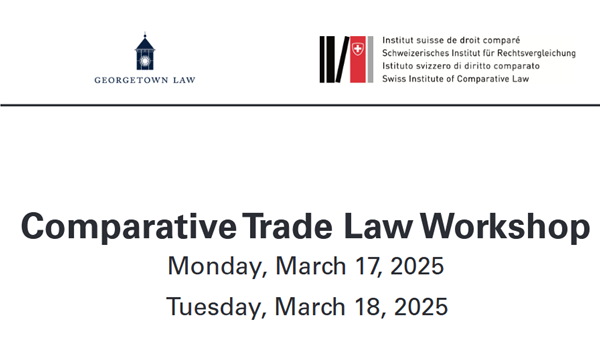
17 mars 2025
Comparative Trade Law Workshop
Washington DC
- EN
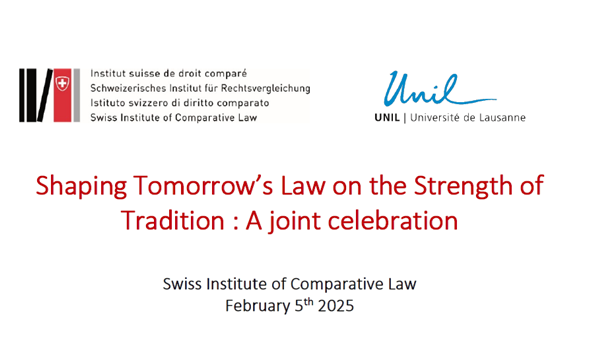
05 févr. 2025
Shaping Tomorrow’s Law on the Strength of Tradition : A joint celebration
Lausanne & Online
- EN
04 déc. 2024
International Economic Law and the Role of the Judiciary
Online (Zoom)
- EN
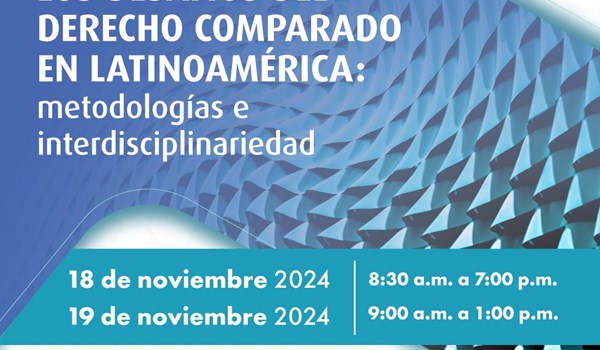
19 nov. 2024
The challenges of comparative law in Latin America: methodologies and interdisciplinarity
Bogota, Colombia
- ES
- EN
Conference
The challenges of comparative law in Latin America: methodologies and interdisciplinarity
18 and 19 November 2024
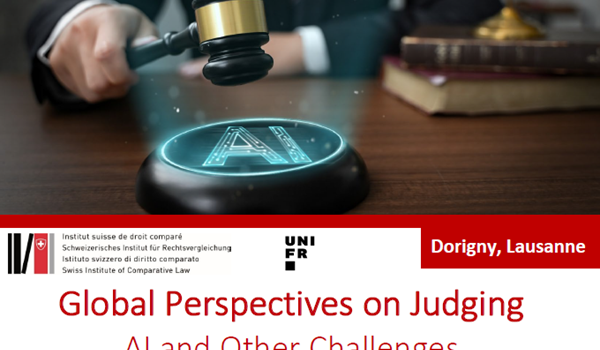
19 nov. 2024
Global Perspectives on Judging: AI and other challenges
Lausanne
- EN
- FR
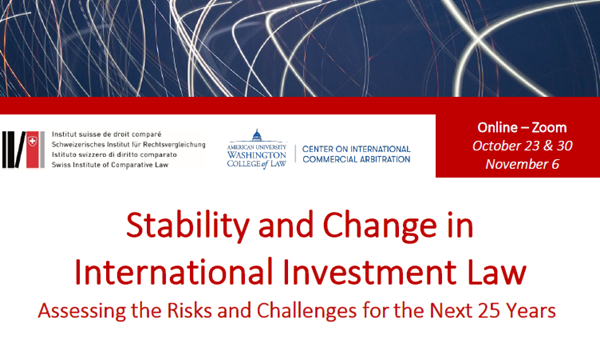
06 nov. 2024
Stability and Change in International Investment Law: Assessing the Risks and Challenges for the Next 25 Years
Online - Zoom
- EN
Three round tables with thought leaders from around the world to assess the future of international investment law and dispute resolution
October 23 & 30, and November 6, 2024
Organized jointly by the AUWCL Center on International Commercial Arbitration (Washington, D.C.) and the Swiss Institute of Comparative Law (Lausanne, Switzerland)

26 sept. 2024
Contrats de mariage d’ici et d’ailleurs
- FR
- EN
Cette conférence explore les points suivants concernant les contrats de mariage :
- La formation, la fonction et les effets selon le droit de différents ordres juridiques (Allemagne, Angleterre, Russie, Suède et Suisse)
- Les particularités du droit des pays arabes
- Les questions de droit international privé suisse
La conférence sera suivie d’un cocktail.
18 sept. 2024
International Economic Law and the Role of the Legislature
Online (Zoom)
- EN

16 juil. 2024
The Role of Sovereign Wealth Funds in the Global Financial Markets: a Legal Viewpoint
Lausanne & Zoom
- EN
Guest Lecture by Dr Lucia Satragno
Sovereign Wealth Funds (“SWFs”) as a group of diverse government-owned investment vehicles have changed considerably since their inception to become key players in the global financial markets. Improvements to their institutional and governance arrangements during the past decade have helped SWFs overcome certain concerns over their purposes and the quality of their investments. During this presentation Dr Satragno analyses the evolution of SWFs’ governance arrangements from a multi-level governance perspective. In doing so, she examines how SWFs—as investment vehicles primarily focused on foreign investments—have taken on expanded roles and become invaluable domestic policy tools that their home countries can rely on to deal with crises. In particular, this presentation offers a study of the different regulatory approaches to SWFs with a special mention to the special case of Singapore’s two funds (GIC Private Limited and Temasek Holdings).
17 juin 2024
International Economic Law and the Role of the Executive
Online (Zoom)
- EN
Based on the expansion of The Edward Elgar's Encyclopedia of International Economic Law to include a section on how international economic law obligations are actually implemented in domestic jurisdictions, this series of seminars aims to provide insights into the role of the different branches of government in IEL rule-making and rule-applying. Our first session will focus on the role of the executive branch, using the legal frameworks of Canada, China, Lesotho, and Liechtenstein as examples
-
Krista Nadakavukaren
Introduction
-
Anthony Van Duzer
Canada
-
Sheng Zhang
China
-
Malebakeng Forere
Lesotho
-
Georges Baur
Liechtenstein

23 mars 2024
BiblioWeekend
ISDC
A l’occasion du BiblioWeekend, l’ISDC propose un escape game pour découvrir ses locaux. Attablez-vous et résolvez une série d’énigmes qui vous mènera dans les quatre coins de notre bibliothèque !
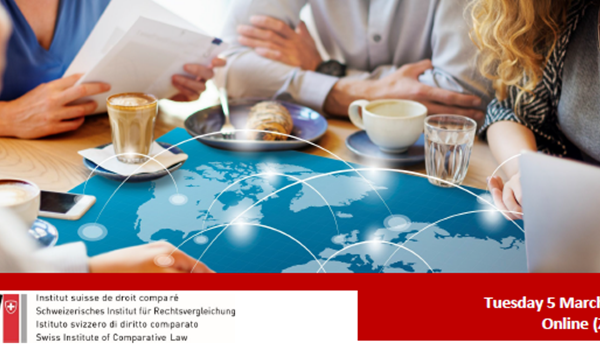
05 mars 2024
Outsourcing digital work under the law: The legal governance of a global workforce
Online (Zoom)
- EN
-
Mira Burri and Kholofelo Kugler, Faculty of Law of the University of Lucerne, Switzerland
Digital Work under Global Trade Law
-
Funda Ustek Spilda, Oxford Internet Institute of the University of Oxford, England
Regulating Platform Work: Conversation Stoppers and Deepeners?
-
Shelley Marshall, Business and Human Rights Centre of the RMIT University, Australia
Ensuring outsourced digital work is decent work: the Draft EU Directive on Corporate Sustainability Due Diligence and the alternatives
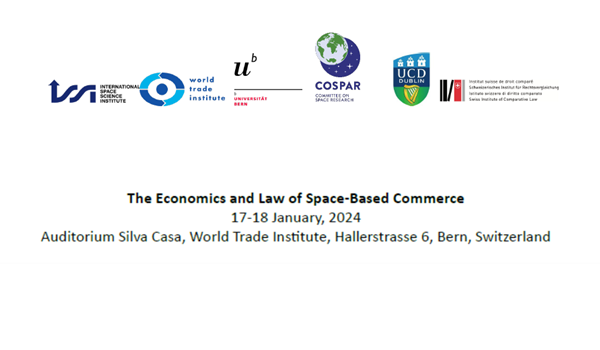
17 janv. 2024
The Economics and Law of Space-Based Commerce
Bern, World Trade Institute
- EN
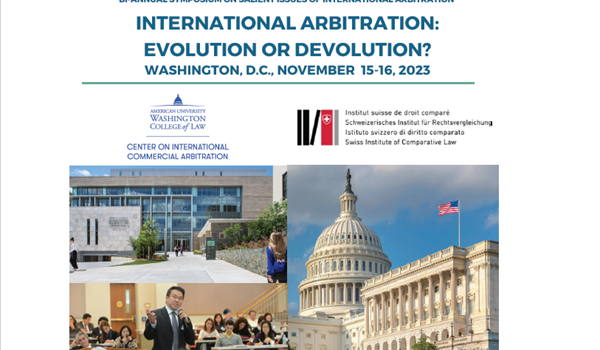
15 nov. 2023
INTERNATIONAL ARBITRATION: EVOLUTION OR DEVOLUTION?
Washington DC (USA)
- EN
Technology, social transformations, politicalupheaval, environmental degradation, and shiftingeconomic priorities require that arbitration and, morebroadly, dispute resolution re-invent themselves.
Challenges are everywhere in this field ofarbitration: Investment arbitration faces challengesby states proposing alternatives to avoid subjectingtheir measures to international arbitral review. Incommercial arbitration, the increasing complexityand quantity of the matters to be resolved, theimpact these cases have beyond the individual parties in dispute, and raising geopolitical tensionsrequire innovative scholarship to offer potentialsolutions.
During the Symposium on November 15 and 16, wewill critically assess where arbitration is headed: isarbitration evolving toward more sophisticated formsor are there setbacks?
Are all current developments increasing efficiency inarbitration proceedings? Does arbitration still offer asuitable solution to business disputes everywhere?
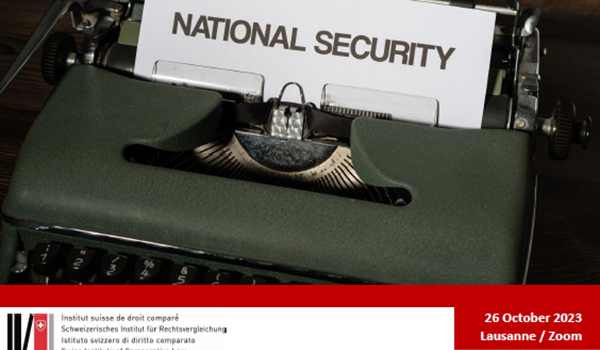
26 oct. 2023
The Changing Concept of National Security and the International Economic Law System
ISDC (Lausanne) & Online (Zoom)
- EN
The recent past has witnessed a growth in national security concerns. The debates about how to address national security have become both deeper and broader as risks having seemingly little to do with military capabilities are labeled “security” threats. From terrorist networks and organized crime to pandemics and climate change, the term “security” has been extended beyond clearly definable bounds. Human security and global security are by now commonly used and interlink with the multiple others. The reemergence of war on European soil and the growing tension in the Asian Pacific, however, offers good cause to look more carefully at what states need to ensure their existence as sovereign entities – that is, at core national security. It has also demonstrated the critical link between core national security and economic power.
This one-day conference takes up an inquiry into the changing views on the concept of national security as revealed in the international economic law system. Over the course of four sessions, it will investigate what governments characterize as “national security” issues, what economic measures they are taking to reduce national security threats, and how international trade and investment decisionmakers see such measures. Drawing on experts from Europe (including Switzerland) and the United States, the discussion will also address the fundamental balance-of-power question of who should decide what is an issue of national security. Finally, the speakers will consider how an expanding view of national security will impact states that are committed to maintaining neutrality.
-
Introductory session
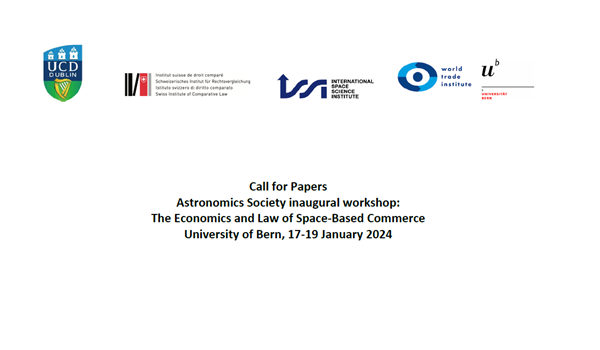
15 sept. 2023
Call for Paper: Astronomics Society inaugural workshop:The Economics and Law of Space-Based Commerce
Berne
- EN
Call for Papers
Astronomics Society inaugural workshop: The Economics and Law of Space-Based Commerce
University of Bern, 17-19 January 2024
This workshop will focus on the economics and governance of commercialization in outer-space. It will look at the applicability of economic concepts, the concepts of international economic law, and the concepts of economic governance to space-based commerce.
06 sept. 2023
Simposio: Los límites de la regulación económica en Latinoamérica
Santiago, Chile
- ES
- PT
Simposio: Los límites de la regulación económica en Latinoamérica
6 de Septiembre, 2023
Facultad de Derecho, Universidad de Chile,
Pío Nono 1, Santiago, Chile
Organizan: Instituto Suizo de Derecho Comparado, Departamento de Derecho Económico y Centro de Regulación y Competencia de la Facultad de Derecho de la Universidad de Chile.
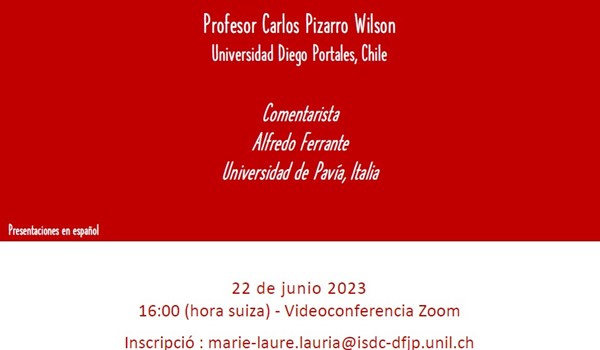
22 juin 2023
Problemáticas de la prescripción extintiva en America Latina y comparación
online
- ES
Profesor Carlos Pizarro Wilson
Universidad Diego Portales, Chile
Comentarista
Alfredo Ferrante
Universidad de Pavía, Italia
Presentaciones en español
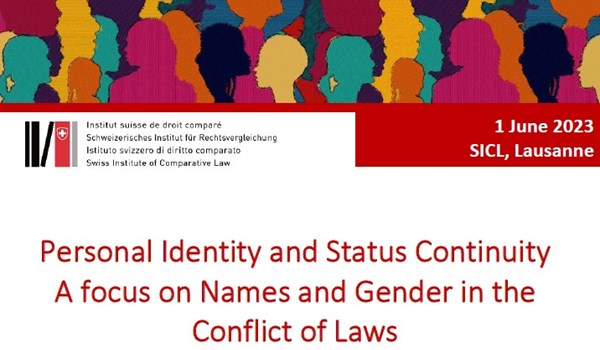
01 juin 2023
Personal Identity and Status Continuity - A focus on Names and Gender in the Conflict of Laws
ISDC
The third session of the conference “Family Status, Identities and Private International Law
– "Personal Identity and Status Continuity
A focus on Names and Gender in the Conflict of Laws” will take place on 1 June 2023 at the Swiss Institute of Comparative Law
-
Rapport du Conseil fédéral sur l'introduction d’un troisième sexe ou abandon de la mention du sexe dans le registre de l’état civil – Conditions et conséquences pour l’ordre juridique suisse
-
The French authorities’ refusal to replace the term “male” by the term “neutral” or “intersex” on the applicant’s birth certificate does not breach Article 8 of the ECHR
-
The Commission’s Parenthood Proposal
-
Relevant documents on Swiss Law and Practice
-
CJEU decision on Garcia Avello
-
CJEU decision on Coman
-
CJEU decision on Pancharevo
-
Programme with abstracts
-
Elena Bargelli/Ilaria Pretelli
A CRITICAL ASSESSMENT IN THE LIGHT OF FUNDAMENTAL RIGHTS
Fichiers
31 mai 2023
Special Event "Movie Night" : The Danish Girl
ISDC, Lausanne
- EN
The law is constantly intervening in the search of our identities, including our gender identity. It protects them, but it also defines and regulates them. Is the law part of the solution for the Danish Girl’s plight, or part of the problem?









